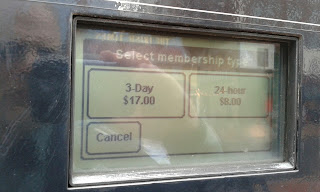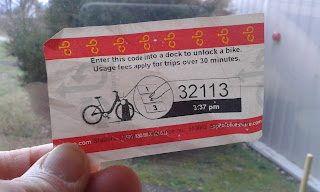Coming back from TRB we all realized the rich set of data and potential case studies we have to share! Oh and DC's Capital bike share is awesome (see 1/9/16 entry)! Blacksburg and VT need to collaborate with bike-share data from Day 1.
Thursday, January 14, 2016
Saturday, January 9, 2016
Capital Bikeshare, Washington DC
 |
| Union Station, Washington, D.C. |
The idea of not owning a
vehicle has broad appeal - imagine no insurance, no maintenance, no storage or
parking fees, or parking passes. Gone is the fear of parking citations or
feeding meters. The benefits go on and on including health benefits, reduced
emissions, good parking and more. But some people have trouble imagining a life
without car-ownership. The concept is pretty simple: Instead of paying an
average of $8,698 annually (nearly $725 a month)[1],
using a bikeshare or carshare is a way to replace or supplement vehicle
ownership. The "share" part means a person rents a bike or car at one
station and returns it to another station. And bikesharing and carsharing
appears to be increasing in popularity, with systems in place throughout the
U.S. in about 60 cities and universities.[2]
 I recently decided to
give it a try. Prior to visiting Washington DC for a conference, a quick online
search revealed the www.capitalbikeshare.com website. I found that a bikeshare
station was located right next to Union Station, where my Megabus trip ended. The
D.C. Bikes smartphone app for an Apple (IOS) is available, and I used either
Spotcycle or the Transit App for finding bike stations and planning
routes. It does take a little bit of
planning; the apps and the website also show how many available bikes are there
and how many empty bike docks are open, and only once during my visit was there
a time when all the docks were full at a bike station near the Convention
Center where the conference was located.
I recently decided to
give it a try. Prior to visiting Washington DC for a conference, a quick online
search revealed the www.capitalbikeshare.com website. I found that a bikeshare
station was located right next to Union Station, where my Megabus trip ended. The
D.C. Bikes smartphone app for an Apple (IOS) is available, and I used either
Spotcycle or the Transit App for finding bike stations and planning
routes. It does take a little bit of
planning; the apps and the website also show how many available bikes are there
and how many empty bike docks are open, and only once during my visit was there
a time when all the docks were full at a bike station near the Convention
Center where the conference was located. Upon arrival in Washington, D.C. my first day, it
was a short walk from Union Station to the nearest station and I found the
Columbus Circle/Union State bike station just across the street. Reading the
website ahead of time is useful, but you can use the kiosk and printed posted
information at the bike station to learn how it operates. I inserted my charge
card, selected a 3-day membership, and was ready to go; I had learned early
from a colleague that to minimize cost, keep trips to under 30 minutes, and
there are no additional charges! So the trick is to find a station within 30
minutes and dock your bike. The kiosk was a bit hard to manipulate - you have
to hit the keys pretty hard to get them to activate but that was about my only
complaint. You are issued a code that you use to unlock a bike and then you are
on your way.
Upon arrival in Washington, D.C. my first day, it
was a short walk from Union Station to the nearest station and I found the
Columbus Circle/Union State bike station just across the street. Reading the
website ahead of time is useful, but you can use the kiosk and printed posted
information at the bike station to learn how it operates. I inserted my charge
card, selected a 3-day membership, and was ready to go; I had learned early
from a colleague that to minimize cost, keep trips to under 30 minutes, and
there are no additional charges! So the trick is to find a station within 30
minutes and dock your bike. The kiosk was a bit hard to manipulate - you have
to hit the keys pretty hard to get them to activate but that was about my only
complaint. You are issued a code that you use to unlock a bike and then you are
on your way.
You can choose to have a
print out of the code if you want, and that also includes a timestamp, so I
printed them each time (you can also print out summaries of your trips
afterwards as well). The bikes themselves are sturdy, 3-speed bikes with front
and rear lights, fenders, and even a handy front-rack with bungee cord to tie
down a bag or other small item. Helmets are available too but I brought my own
along, as well as my deglo-jacket. Frankly I never felt unsafe as speeds are
low, vehicle drivers seemed pretty aware of bikes, and bike lanes do exist in
many parts of DC.
The Transportation Research Board is an annual conference that has taken place for 95 years, so it seemed fitting to try Capital Bikeshare while there. And the popularity is growing - visit the Capital Bikeshare website and select the System Data tab to download information on trip history data by month. A quick review of the latest data revealed that for 706,004 trips completed within 3 months, 85 percent were completed by registered members and 15 percent by casual members like myself (1 or 3 day memberships).
The average trip duration
was 16 minutes and the longest trip was 23 hours, 50 minutes, likely a case
where a bike was rented and then parked overnight before being returned to
another station. Mileage data was not included, but I understand that the
majority of trips are less than 1.5 miles in length[3].
Virginia Tech has released a request for proposals for a bikeshare program,
here in Blacksburg, VA. I hope the decision makers bring it soon! While it may
not be the option of choice for everyone, I am confident that with "over
36,000 students, faculty, and staff, with a vast majority living within
bicycling and walking distance to campus"[4]
that bikeshare in our area will also be a popular option for commuting to,
within, and outside of the university campus. A Virginia Tech bikeshare program
will benefit both the university members as well as non-university town
residents who may want to keep their car (or bike) at home, or not even own
one.
[1]
Annual Cost to Own and Operate a Vehicle Falls to $8,698, Finds AAA. http://newsroom.aaa.com/2015/04/annual-cost-operate-vehicle-falls-8698-finds-aaa/
(April, 2015).
[2] Commuting,
Shared-Use Mobility, Smart Infrastructure, Climate Change, and Rural
Transportation Trends, http://www.vtrans.org/resources/VTransTrends_Commuting_and_Mobility.pdf
(Sept, 2014).
[3]
Arlington County Capital Bikeshare Transit Development Plan Fiscal Years 2013
to 2018. http://www.bikearlington.com/tasks/sites/bike/assets/File/TDP_Summary.pdf
[4]
Virginia Tech Request for Proposal #0038495 for Bike Share Program (April 21,
2015) Info at: http://www.bidsvirginia.com/virginia_bids/bids-ADP14296226510000628.htm
Subscribe to:
Comments (Atom)




